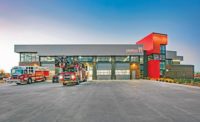Today�s MKK Consulting Engineers Inc.�three bustling offices tackling a full docket of projects�is a far cry from the company that began in the 1950s as a sole practice.
A lot has changed, but the values and discipline instilled by founder Jim Konkel have continued in earnest.
�We like to hire around a person�s value system; it needs to match ours,� MKK President Stuart Monical says. �We�re about customer service, innovation, integrity, knowledge, passion and teamwork. You can train people in the technical aspects of the work, but it�s harder to train values. They have to have those already.�
Birth of a Partnership
The values of MKK were instilled in 1955, with the founding of Stark & Konkel Consulting Engineers in Denver.
Four years later, in 1959, James H. Konkel determined to open his own practice, focusing on HVAC consulting. But Konkel was not an equipment manufacturer or expert. Instead, his consultancy would draw upon his education and work experience as a chemical engineer.
One year later, in 1960, Konkel hired his first full-time employee, James D. McFall, whom he�d met, as McFall tells it, �while I was a student at the University of Denver, working part time parking cars. I saw that he was carrying plans and asked if he was an architect or an engineer.�
McFall says that when Konkel found out he was a chemical engineering student, Konkel invited him to come to the office and talk. Konkel offered him a job as a draftsman during his senior year.
In 1960, while serving in the Army, McFall received a series of letters from Konkel (�I still have them all,� he says) expressing his interest in HVAC consulting and extending an offer of work. He accepted the job, becoming a partner seven years later in what would be McFall and Konkel Consulting Engineers. McFall stayed with the company, ascending to the presidency when Konkel retired in 1981, until his own retirement in 1991. Konkel died in 2006.
�Jim Konkel was unique in not coming from a sales background, and we had a shared attitude about how the buildings should be designed, built around the idea of a flow diagram,� McFall says.
Becoming MKK
In 1963, William R. Kimball joined the small firm, increasing the total headcount to eight. Thirteen years later, in 1980, he became the third partner of the firm, which was newly minted as McFall, Konkel and Kimball. In 1991, Kimball took over from McFall as president.
�I found what I wanted to do early in life,� Kimball says. An avid skier � and still competitive on the Masters Circuit � Kimball was �the Mountain Guy, willing to go over the pass and see clients in Aspen and Vail. It became a specialty area we developed.� Although he retired in 1995, he still works on an occasional project.
Not one to buck tradition, Monical, who has been president since 2005, has also remained with MKK for decades. �I started to work for the company in December 1973, right out of college,� he says. �What�s kept me here is the continued opportunity to grow. I�ve never felt restricted. Creative, innovative approaches are encouraged.�
MKK has concentrated on recruiting highly educated employees and providing them with precisely the type of nurturing atmosphere that creative minds crave. �We insisted on an engineering degree [for technical staff],� McFall says. �We recognized that the industry, as a group, was becoming more complicated and we knew we needed employees that understood the principles.�
High-Profile Clientele
Understanding that quality staff is the backbone of client service, MKK works tirelessly to attract and retain both engineers and a support staff who understand the technical brain.
Now, at just over 50 years old, the firm boasts nearly 100 employees in its headquarters in Greenwood Village, a Denver suburb, as well as in branch offices in Cheyenne and Billings.
The depth of personnel allows MKK to pursue ever-larger and higher-profile projects that serve a range of market sectors: commercial, communications, education, government, health care, hospitality, industrial, institutional and transportation. Clients include the National Renewable Energy Laboratory, National Park Service, Denver Art Museum, Xcel Energy, Colorado Springs Fine Arts Center, 360networks and Burlington Northern Santa Fe Railway.
Early on, MKK leadership actively welcomed women and minorities to join�and stick with�the engineering profession. Kimball recalls that women were rarely included among technical staff across the industry back then, but �we really encouraged them, made it a comfortable place to work where they�re treated as equals,� he says.
In 1977, MKK hired Jean Petkovsek, the first woman engineer at the firm, and she now is one of the longer-tenured employees.
MKK has also long fostered a culture of respect for partners outside the firm. Even as it was breaking away from manufacturer-led consulting, the firm continued to work closely with suppliers. Today, sales engineers, contractors and manufacturing reps are respected for their expertise and the critical role they play in the engineering process.
Extremely active in industry organizations such as the American Society of Heating, Refrigerating and Air-Conditioning Engineers, and the American Council of Engineering Cos., the firm is always looking to give back to the profession and the community. At the same time, it�s looking forward. When asked about industry drivers, Monical cites the existing building market and such services as retro-commissioning as huge factors in the near future.
McFall says the firm�s success is tied to its people. �It�s important that people didn�t see a ceiling and that everyone who joined saw an opportunity to participate,� he adds. �That�s important in keeping a firm alive.�








Post a comment to this article
Report Abusive Comment